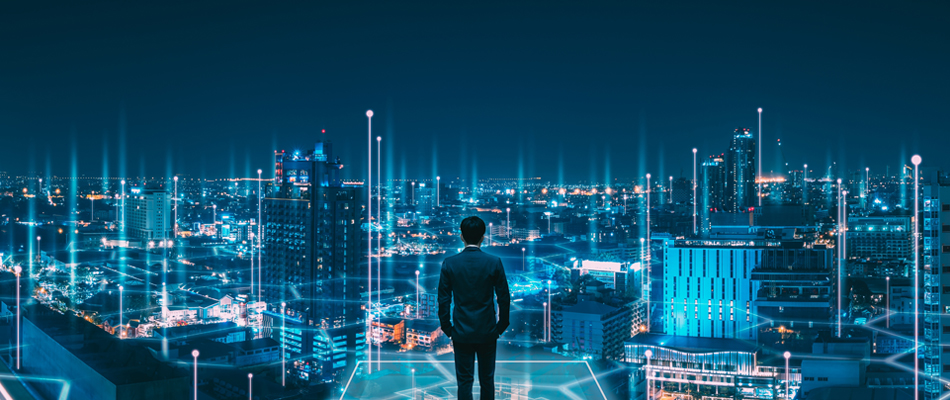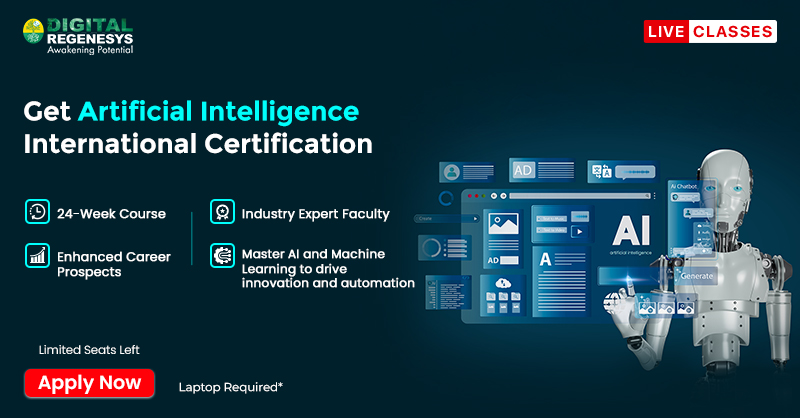How Artificial Intelligence is Shaping the Future of Work?

Artificial Intelligence (AI) is shaping the future of work by redefining job roles, improving productivity, and creating new opportunities across industries. From human-AI collaboration to remote work support, AI is transforming workplace structures and expectations. While challenges such as job displacement and ethics remain, continuous upskilling ensures readiness for the AI era.
In this article, we will cover how Artificial Intelligence is shaping the future of work, the opportunities and challenges it brings, and how professionals can prepare themselves for success in an AI-driven world.
Understanding AI in the Workplace
AI in the workplace refers to the use of intelligent systems that process data, learn from it, and perform tasks once reliant on human input. Unlike traditional automation, which focuses purely on efficiency, AI enhances human roles by offering predictive insights and adaptive solutions.
Some practical examples include:
- Chatbots – Used in customer service to handle repetitive queries instantly, reducing wait times and freeing up human agents for complex issues.
- Predictive analytics – Applied in industries like finance and retail to forecast demand, identify risks, and guide business decisions with higher accuracy.
- Robotic process automation (RPA) – Automates data entry, invoice processing, and compliance reporting, cutting costs and minimising human error.
The table below outlines some common uses of AI across industries:
|
Industry |
AI Application Example |
Impact on Work |
|
Banking & Finance |
Fraud detection, risk assessment |
Faster decisions, reduced losses |
|
Healthcare |
Diagnostic imaging, drug discovery |
Improved accuracy, better outcomes |
|
Retail |
Personalised shopping recommendations |
Enhanced customer experience |
|
Education |
Adaptive learning tools |
Tailored student learning experiences |
Read more on Which Programming Language is Best for AI? Here
Transformation of Job Roles
AI adoption is redefining professional roles across industries. Routine and repetitive tasks are increasingly automated, leaving humans to focus on creative, strategic, and problem-solving responsibilities. For example, clerical data entry positions are declining, while demand for data analysts and AI model trainers is growing.
Emerging career paths include:
- AI Ethics Specialists – Professionals who ensure algorithms are transparent, unbiased, and socially responsible.
- Data Scientists and Analysts – Experts who gather, clean, and interpret data to help businesses make strategic decisions.
- AI Trainers – Individuals who train and refine AI models, improving accuracy in tasks like language recognition and image processing.
Professionals who embrace continuous learning are best placed to adapt and thrive in this evolving environment.
Read more on Why do Companies Value Employees with Artificial Intelligence Course Certificates? here

AI and Productivity Gains
One of the most significant advantages of Artificial Intelligence in the workplace is its ability to increase productivity without compromising accuracy. Organisations are adopting AI tools to reduce operational costs, anticipate customer needs, and create more efficient business processes.
By shifting repetitive and time-consuming tasks to AI systems, employees can focus on higher-level responsibilities such as strategy, creativity, and problem-solving. This shift is transforming how companies operate and how employees contribute value.
Examples of AI-driven productivity improvements include:
- Supply chain optimisation – AI can forecast demand fluctuations with greater precision, enabling businesses to manage inventory effectively and reduce waste. Predictive models also help avoid costly stockouts and delays by improving logistics planning.
- Financial forecasting – Advanced AI-powered models analyse vast datasets to identify market trends and provide data-driven insights. This allows financial teams to make more informed investment decisions, enhance risk assessments, and develop effective long-term growth strategies.
- Customer service personalisation – AI systems can track and interpret customer behaviour, offering tailored product or service recommendations. This not only boosts customer satisfaction but also drives loyalty and repeat business by creating more meaningful experiences.
The Rise of Human-AI Collaboration
Contrary to the fear that AI replaces jobs, many workplaces are experiencing human-AI collaboration. AI functions as a “digital co-worker” that processes data at scale, allowing humans to focus on innovation and leadership. This partnership highlights the future of augmented intelligence, wherein the machines do the heavy lifting while humans provide judgment and creativity.
Examples of collaboration include:
- Content creation – AI tools generate initial drafts or visuals, while humans refine the content to add creativity and context.
- Business reporting – AI produces real-time dashboards and insights, while managers interpret results and implement strategies.
- Recruitment – AI scans CVs and matches candidates to roles, but HR professionals assess cultural fit and make final hiring decisions.
Challenges and Ethical Considerations
While Artificial Intelligence brings enormous opportunities, it also presents challenges that organisations must carefully address. Although AI creates new opportunities, the transition is not always straightforward, making reskilling and upskilling essential for employees to remain relevant in the evolving workplace.
Beyond workforce shifts, AI adoption raises important ethical questions. Businesses need to ensure that AI is applied responsibly and does not compromise trust or fairness. Some of the most pressing ethical issues include:
1. Data privacy
Organisations must safeguard sensitive information and ensure that customer and employee data is not misused. Robust cybersecurity and compliance practices are necessary to maintain trust.
2. Algorithmic bias
AI models can unintentionally reflect human or systemic biases present in training data. If left unchecked, this can result in unfair outcomes, particularly in sensitive areas such as recruitment, lending, or performance evaluation.
3. Transparency
Many AI systems function as “black boxes,” making it difficult for users to understand how decisions are reached. Developing explainable AI models is vital so employees and customers can trust the technology and feel confident in its outputs.
Upskilling and Reskilling for the AI Era
In the age of Artificial Intelligence, adaptability has become one of the most valuable professional traits. As workplaces evolve, employees who invest in continuous learning will be better positioned to thrive. Beyond technical proficiency, cultivating digital literacy and strengthening soft skills such as leadership, creativity, and emotional intelligence is critical.
To remain competitive in an AI-driven economy, professionals can take practical steps such as:
- Enrolling in an AI certification course – Structured training builds both foundational and advanced skills, helping professionals apply AI effectively in real-world business contexts.
- Attending workshops and online courses – Short learning modules provide exposure to new tools, frameworks, and best practices, ensuring skills stay relevant in a rapidly changing environment.
- Developing soft skills – Abilities like critical thinking, communication, and creativity help individuals complement AI systems rather than compete with them.
The Future Workplace: Trends to Expect
The workplace of the future will be increasingly shaped by Artificial Intelligence, with profound implications for how organisations operate and how professionals contribute. As AI adoption grows, employees can expect technology to enhance efficiency, streamline decision-making, and transform traditional workflows.
Some of the main rends to watch include:
1. AI-driven recruitment
Intelligent systems will screen CVs, assess skills, and match candidates to roles with greater accuracy. By reducing human bias and speeding up the hiring process, AI enables HR teams to focus on evaluating cultural fit and strategic alignment.
2. Performance management systems
Advanced AI tools will monitor employee productivity in real time, providing actionable insights and personalised feedback. This allows managers to identify skill gaps, optimise team performance, and support career growth more effectively.
3. Autonomous systems across industries
From logistics and supply chain management to healthcare diagnostics and financial services, AI-powered autonomous systems will perform routine and complex tasks with minimal supervision. These systems enhance efficiency, minimise errors, and enable employees to concentrate on strategic initiatives rather than manual tasks.
Conclusion
Artificial Intelligence is not replacing human potential; rather, it is reshaping the way we work. By handling repetitive tasks, AI enables professionals to focus on creativity, strategy, and leadership. At the same time, the challenges of ethics, reskilling, and fair adoption must be addressed to ensure inclusive growth.
For professionals, the future workplace is one where continuous learning is indispensable. By developing AI skills, embracing digital literacy, and striking a balance between ethics and innovation, individuals can thrive in this new era.
Take the next step towards future readiness with the Digital Regenesys Certification in Artificial Intelligence and prepare for a workplace shaped by intelligent technologies. Explore more at Digital Regenesys.
Last Updated: 30 September 2025
